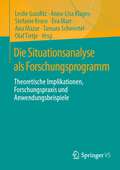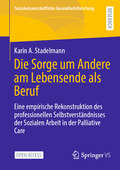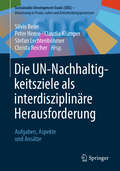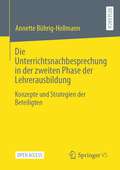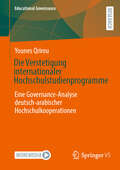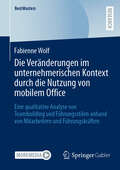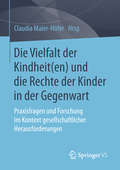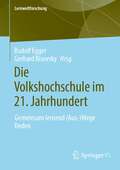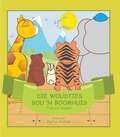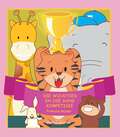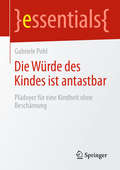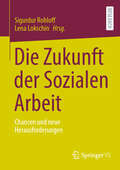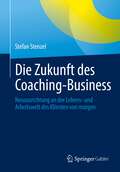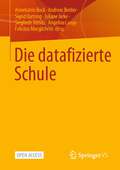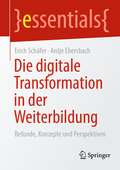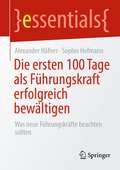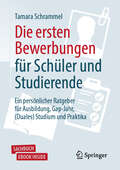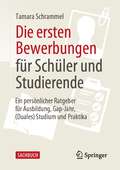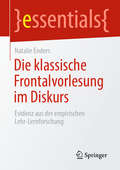- Table View
- List View
Die Signifikanz von: Eine Analyse ausgewählter Bildungslehrpläne für den Islamischen Religionsunterricht (BestMasters)
by Gökce AydinEntwicklungspsychologische Forschungen belegen, dass moralische Emotionen wie Mitgefühl eine entscheidende Rolle bei der Entwicklung ethischer Urteils- und Handlungsfähigkeiten spielen. Ein zentraler Ansatzpunkt dieses Buches ist die islamisch-theologische Analyse von Mitgefühl, das auf den Prinzipien der Barmherzigkeit und Liebe basiert. Diese Prinzipien legen nahe, dass der Mensch aufgrund seiner religiösen und ontologischen Natur dazu befähigt ist, Mitgefühl als eine göttliche Gabe zu verstehen und als religiösen Auftrag im Umgang mit anderen Menschen und der Schöpfung zu praktizieren. Daher ist die Förderung von Mitgefühl im Religionsunterricht aus religionspädagogischer Perspektive von Bedeutung. Diese Arbeit setzt sich mit der theoretischen Fundierung des Mitgefühls auseinander und reflektiert verschiedene didaktische Zugänge. Durch eine exemplarische Analyse des Kerncurriculums in Niedersachsen und des Kernlehrplans in Nordrhein-Westfalen werden mögliche inhaltliche, methodische und didaktische Implikationen für den Islamischen Religionsunterricht herausgearbeitet. Auf der Grundlage dieser Analyse werden Ideen zur Integration des Mitgefühls in den Islamischen Religionsunterricht entwickelt.
Die Situationsanalyse als Forschungsprogramm: Theoretische Implikationen, Forschungspraxis und Anwendungsbeispiele
by Olaf Tietje Eva Marr Leslie Gauditz Anna-Lisa Klages Stefanie Kruse Ana Mazur Tamara SchwertelDer Sammelband trägt die unterschiedlichen Debatten um die Situationsanalyse in Anschluss an Adele Clarke zusammen. In den einzelnen Kapiteln werden hierzu theoretische, methodologische und/oder empirische Überlegungen wie auch deren Leerstellen und Weiterführungen diskutiert sowie methodische Ansätze konkretisiert. Damit greift die Publikation offene Fragen und Weiterführungen des Clarke‘schen Theorie-Methoden-Pakets der Situationsanalyse auf und liefert so einen Beitrag zur Fortentwicklung einer Methodologie, die insbesondere für inter- und transdisziplinäre Forschungsprojekte vielfältige Impulse bietet. Der Sammelband adressiert (Nachwuchs-)Forschende, die mit der Situationsanalyse arbeiten oder diesen Ansatz für ihre Arbeit entdecken möchten. Das Werk soll sowohl Studierende als auch Wissenschaftler*innen und Praktiker*innen unterschiedlicher Disziplinen und Ausrichtungen ansprechen.
Die Sorge um Andere am Lebensende als Beruf: Eine empirische Rekonstruktion des professionellen Selbstverständnisses der Sozialen Arbeit in der Palliative Care (Sozialwissenschaftliche Gesundheitsforschung)
by Karin A. StadelmannDieses Open Access Buch behandelt die Arbeitsweisen der Sozialen Arbeit in der Palliative Care, um deren Sichtbarkeit zu erhöhen. Die zentrale Forschungsfrage lautet, wie Fachkräfte der Sozialen Arbeit ihr berufliches Handeln in der Palliative Care beschreiben. Die Autorin führte dazu Interviews mit Sozialarbeitenden in Hospizen und auf Palliativabteilungen. Aus den Erzählungen wurden Orientierungsmuster und Begründungen extrahiert und im Kontext ausgewählter strukturtheoretischer und interaktionistischer professionstheoretischer Grundlagen analysiert. Die Ergebnisse betonen verschiedene Motive für die Soziale Arbeit, die das professionelle Selbstverständnis in der Begleitung am Lebensende strukturieren. Besonders die "Unbestimmbarkeit im Alltag als beruflicher Standard" und "die Suchbewegung als professioneller Akt" verdeutlichen die Bedeutung alternativer Konzepte für Professionalität und Fallbearbeitung für die Sorge am Lebensende. Die Ergebnisse gewinnen zudem an Bedeutung vor dem Hintergrund versorgungspolitischer Entwicklungen. Die Darlegungen zu institutionellen und politischen Bedingungen in der Schweiz legen weitere Eckpfeiler fest, um die professionelle Eigenständigkeit der Sozialen Arbeit in der Palliativversorgung zu stärken.
Die Syrien-Krise: Vergangenheit, Gegenwart und Zukunft
by Shahid Hussain Raja Omar Hayat RajaErläutert das Wesen und die Ursprünge der gegenwärtigen Krise in Syrien vor dem Hintergrund der geopolitischen und sonstigen Verwerfungen im Nahen Osten, zählt die Interessen der verschiedenen globalen und regionalen Mächte auf und zeigt auf, wie sie auf die sich rasch entwickelnde Situation reagieren, zeigt mögliche Ergebnisse auf und schlägt den besten Weg vor.
Die UN-Nachhaltigkeitsziele als interdisziplinäre Herausforderung: Aufgaben, Aspekte und Ansätze (Sustainable Development Goals (SDG) – Umsetzung in Praxis, Lehre und Entscheidungsprozessen)
by Christa Reicher Silvio Beier Peter Hense Claudia Klümper Stefan LechtenböhmerDieses Buch gibt Einblicke in die Zielsetzungen und zu den Herausforderungen der Nachaltigkeistzielde der UN. Ausgehend von den Blickwinkeln einzelner Fachdisziplinen wird allgemein verständlich die Zelsetzung mit einem Blick auf europäische Verhältnisse erläutert und mit den Anforderungen an andere Fachdisziplinen verknüpft, die notwendig sind, damit ein Erreichen realistisch und zielführend vorangetrieben werden kann.
Die Unterrichtsnachbesprechung in der zweiten Phase der Lehrerausbildung: Konzepte und Strategien der Beteiligten
by Annette Bührig-HollmannIn diesem Open-Access-Buch werden anhand einer kommunikationsanalytischen Studie unterschiedliche Konzepte der Ausbildenden und der Auszubildenden für die Unterrichtsnachbesprechung rekonstruiert. Die Unterrichtsnachbesprechung in der zweiten Phase der Lehrerausbildung gilt für viele Referendarinnen und Referendare als eine besondere Belastung innerhalb ihrer Ausbildung. Mit der Rekonstruktion der in NRW programmatischen Leitideen erwachsenenpädagogischer Prinzipien einerseits und den Positionierungen der Referendar:innen andererseits offenbaren sich diverse Spannungslagen in der Lehrer:innenbildung. Neben der strukturell angelegten Doppelfunktion der Ausbildung (Beratungund Beurteilung) sind es vor allem die unterschiedlichen Orientierungen der Beteiligten mit ihrer heterogenen Erwartungskultur, die die Kommunikation in Ausbildungskontexten stören.
Die Verstetigung internationaler Hochschulstudienprogramme: Eine Governance-Analyse deutsch-arabischer Hochschulkooperationen (Educational Governance #59)
by Younes QrirouAufgrund der politischen Umwälzungen der letzten zwanzig Jahre __ in der Region Mittlerer Osten und Nordafrika (MENA) gewann die deutsch-arabische Hochschulzusammenarbeit eine strategische Bedeutung für die deutsche Entwicklungspolitik. Der Deutsche Akademische Austauschdienst (DAAD) unterstützte zwischen 2005 und 2020 den Aufbau von zehn kooperativen Studienprogrammen mit Partneruniversitäten in Ägypten, Jordanien und dem Libanon. Diese Programme hatten das Ziel, einen entwicklungspolitischen Impact in Bereichen wie nachhaltige Stadtentwicklung, integriertes Wassermanagement, Förderung erneuerbarer Energien sowie wirtschaftlicher und politischer Transition zu erzielen. Bisher fehlen theoretisch fundierte Untersuchungen zur komplexen Durchführung solcher Studienprogramme. Diese Studie untersucht aus organisationstheoretischer Perspektive, wie Kooperationspartner gegenseitiges Vertrauen aufbauen, institutionelle Legitimität erlangen und Ressourcenabhängigkeit umgehen können, um internationale Hochschulstudienprogramme nach der Gründungsphase zu verstetigen. Mittels umfassender Dokumenten- und Interviewbasierte Analyse der Bedingungen der Entstehung und Umsetzung der Studienprogramme werden Mechanismen der kooperativen Governance identifiziert, die die Programmverstetigung fördern. Abschließend typisiert die Studie Organisationsformen deutsch-arabischer Hochschulkooperationen und gibt Empfehlungen für Initiatoren und Förderer kooperativer Studienprogramme.
Die Veränderungen im unternehmerischen Kontext durch die Nutzung von mobilem Office: Eine qualitative Analyse von Teambuilding und Führungsstilen anhand von Mitarbeitern und Führungskräften (BestMasters)
by Fabienne WolfIn diesem Buch wird untersucht, wie sich Teambuilding und Führungsstile durch die vermehrte Nutzung von mobilem Office infolge der Corona-Pandemie ändern. Zu der Zielgruppe dieser Arbeit zählen alle Unternehmen, die mobiles Arbeiten anbieten ebenso wie alle Arbeitnehmer und Forscher, die sich mit diesen Themen auseinandersetzen. Die Arbeit basiert auf qualitativen Interviews mit Führungskräften und Teammitgliedern verschiedener Branchen. Es werden die Herausforderungen und Potenziale des mobilen Office analysiert. Dabei liegt der Fokus auf Teambuildingmaßnahmen je nach Entwicklungsphase, der Anpassung von Führungsstilen und der Wichtigkeit von Kommunikation in dezentralen Teams. Zudem wird deutlich, dass flexible Arbeitsregelungen, die technologische Ausstattung und ein Vertrauensverhältnis zur Führungskraft entscheidend für das erfolgreiche Arbeiten in dezentralen Teams sind. Die Studie leitet Handlungsempfehlungen für Führungskräfte und Unternehmen ab, um geeignete Rahmenbedingungen für dezentrales Arbeiten zu schaffen.
Die Vielfalt der Kindheit(en) und die Rechte der Kinder in der Gegenwart: Praxisfragen und Forschung im Kontext gesellschaftlicher Herausforderungen
by Claudia Maier-HöferEine Verbindung von Praxisreflexion und Erarbeitung von wissenschaftlichen Konzepten, um eine diverse und sich verändernde gesellschaftliche Realität des Aufwachsens von Kindern zu ordnen, soll in diesem Band als Aufgabe Angewandter Kindheitswissenschaften hergestellt werden. Auf der gemeinsamen Grundlage des Bezugs zu den Kinderrechten werden Diskussionen über gesellschafts- und professionspolitische Zusammenhänge in Bezug zu dominierenden Paradigmata, Perspektiven und Positionen geführt. Wissenschaftliche Diskurse, politische und ethische Diskussionen und Praktiken werden untersucht, herausgefordert und erweitert. Die Öffnung der Angewandten Kindheitswissenschaften für internationale sowie lokale und globale Fragestellungen, wie sie von den Autor*innen in ihren Beiträgen geleistet wird, schließt an die Dynamiken in den gegenwärtigen Debatten an. Die Verflechtungen von Perspektiven und Positionen provozieren Stellungnahmen und inspirieren Forschung. Sozialpolitische und paradigmatische Transformationen werden erkennbar.Der InhaltAktuelle Fragen der Angewandten Kindheitswissenschaften ● Postkoloniale Dilemmata der Kinderrechte ● Transnational Mobility and Education Continuity in Italian Compulsory Schools – Teachers' Narratives on Children’s Transnational Experiences ● Migrant and Refugee Children in Polish Schools in the Face of Social Transformation ● Das Recht von Mädchen und Jungen auf Teilhabe an der OntologieDie HerausgeberinDr. Claudia Maier-Höfer ist Professorin für Kindheitswissenschaften an der Evangelischen Hochschule Darmstadt.
Die Volkshochschule im 21. Jahrhundert: Gemeinsam lernend (Aus-)Wege finden (Lernweltforschung #43)
by Rudolf Egger Gerhard BisovskyDer Band fragt auf der Grundlage derzeitiger Lebensbedingungen danach, welche Aufgaben, Formen, Formate, Wege und Visionen die Volkshochschule heute braucht, um neue Erlebnis- und Begegnungsräume für das Miteinander schaffen zu können. Wie nimmt die Volkshochschule die Aufgaben einer zeitgemäßen Erwachsenenbildung wahr, um mit der steigenden Komplexität der Lebensbedingungen zurechtzukommen und um die wachsenden Unterschiede und das Ungewohnte lernend zu bewältigen? Welche Lern- und Begegnungsangebote braucht es, um Menschen in ihren Lebenswelten, in ihren vielfältigen biographischen und praktischen Lebensbedürfnissen soziale Anschlussmöglichkeiten zu bieten?
Die Woudties bou 'n boomhuis
by Francois Keyser Elrika KeyserWelkom in die wereld van "Die Woudties" "Die Woudties" is 'n reeks kinderboeke wat vertel van die unieke avonture van 5 dieremaats. "Die Woudties" boeke is almal geskryf met 'n les vir jong lesers om te leer. Die les in hierdie boek is dat ons soms na ons omstandighede moet kyk van 'n ander oogpunt om dinge meer duidelik te kan sien. In hierdie boek leer die Woudties om hulle blyplek te waardeer. Dit is soms so maklik om te dink die lewe sal beter wees op 'n ander plek , terwyl ons eintlik net ons perspektief moet verander... Francois se oudste dogter was sy inspirasie om "The Junglies" te skryf. "Die Woudties" is oorspronklik in Engels geskryf en staan in Engels bekend as "The Junglies". Vir meer inligting oor "The Junglies" en Francois besoek asseblief http://www.thejunglies.com of gaan kyk na " The Junglies" se bladsy op FaceBook by www.facebook.com/tigerloseshisstripes
Die Woudties en die Sang Kompetisie
by Francois Keyser Alma PretoriusAgterblad: Welkom by die wêreld van "Die Woudties". "Die Woudties" is 'n kinderboek reeks waarvan elkeen 'n unieke storie vertel omtrent die avonture van vyf woud diere. Elke boek in "Die Woudties" reeks is geskryf met 'n les vir jong lesers om te leer. Die les in hierdie boek is dat ons soms meer kan bereik met spanwerk. In hierdie boek wil die maatjies vir 'n sang kompetisie inskryf, maar hulle leer vinnig dat dit partykeer beter is om saam te werk. Sal hulle die les betyds leer om die kompetisie te wen? Francois was geïnspireer deur sy oudste dogter om "Die Woudties" boek reeks te skryf. "Die Woudties" is van Engels na Afrikaans vertaal en staan bekend as "The Junglies" in engels. Om meer omtrent "The Junglies" en Francois te leer, besoek asseblief sy webblad by http://www.thejunglies.com of besoek "The Junglies" se Facebook bladsy by www.facebook.com/tigerloseshisstripes.
Die Würde des Kindes ist antastbar: Plädoyer für eine Kindheit ohne Beschämung (essentials)
by Gabriele PohlKinder haben ein Recht auf gewaltfreie Erziehung und seine Einhaltung ist unabdingbar für die freie Entfaltung ihrer Persönlichkeit. Beschämung, Herabsetzung, Demütigung können schwerwiegende Folgen für die Psyche des Kindes haben. Psychische Gewalt in diesem Sinne wird aber oft nicht als solche erkannt, denn sie hinterlässt keine offensichtlichen Narben. Aus Hilflosigkeit, wider besseres Wissen oder aus einem technokratischen Menschenbild heraus werden herabwürdigende Erziehungsmaßnahmen in der Familie und in den Institutionen angewandt. In den Medien werden zunehmend Menschen vorgeführt und beschämt. Fragwürdige Erziehungsmethoden werden dort propagiert. In Youtube-Videos werden Kinder der Lächerlichkeit preisgegeben. Konditionierung ist kein menschengemäßes Erziehungsmittel. Die Menschenwürde entsteht aus dem Moment der Freiheit. Gabriele Pohl fragt in diesem essential, wie die Bedingungen sein müssen, die die Würde der Kinder und der Jugendlichen achten.
Die Zukunft der Sozialen Arbeit: Chancen und neue Herausforderungen
by Sigurður A. Rohloff Lena LokschinWelche Anforderungen werden an eine robuste und gesellschaftlich anerkennenswerte Soziale Arbeit gestellt, die in ihrer wissenschaftlichen Disziplin, in der Anschlussfähigkeit ihrer Theorien und in der Anerkennung ihrer Profession überzeugt und dabei noch in sich konsistent ist? Im internationalen Vergleich der Theoriebestände und praktischen Bezüge von Sozialer Arbeit herrscht eine große Diversität und Vielfalt, die sich durch unterschiedliche gesellschaftliche und nationalstaatliche Makro-Bedingungen herausgebildet haben.Gleichzeitig globalisieren sich die Krisen wie Kriege, Pandemien, Klimawandel, Armut und Hunger in einer beschleunigten Weise, welche eher eine pragmatische Theoriebildung und Praxis der Sozialen Arbeit im Sinne von globalen Wohlergehen und Menschenrechten herausfordert. In einer neuen und beschleunigten Anpassungsdynamik reagiert Soziale Arbeit eher darauf, als dass sie selbständig agiert.Kritischer Rationalismus, kritische Gesellschaftstheorie und ethische Orientierung der Sozialen Arbeit werden gerade im internationalen Kontext unter dem Einfluss neuer und schwer überschaubarer globaler Krisen und Herausforderungen noch stärker gefragt werden. In diesem Sammelband werden Beiträge von Autorinnen und Autoren zusammengestellt, die die möglichen Zukunftsperspektiven der Sozialen Arbeit erhellen sollen.
Die Zukunft des Coaching-Business: Neuausrichtung an der Lebens- und Arbeitswelt des Klienten von morgen
by Stefan StenzelIn diesem Fachbuch erfahren Coaches, deren Ausbilder und HR-Verantwortliche wie sich das Coaching verändern muss, um Klienten in ihren sich ständig wandelnden Arbeits- und Lebenswelten auch zukünftig einen attraktiven Service bieten zu können. Auf den Fachtagungen der letzten Jahre wurde die „Zukunft des Coachings“ meist stark auf die Einsatzmöglichkeiten und Wirksamkeit des Online-Coachings eingeengt. Zur Abschätzung der zukünftigen Entwicklungen des Service „Coaching“ sind jedoch neben den zukünftigen technologischen Einflüssen auch die massiven gesellschaftsstrukturellen- und -psychologischen Phänomene des nächsten Jahrzehnts einzubeziehen. Die Transformation hin zur sog. Arbeit 4.0 zeigt sich für den Klienten in neuen Arbeitsformen sowie einem massiven Wandel des Verständnisses von Führung und der eigenen Lebens- und Erwerbsbiografie. Um weiterhin einen Mehrwert für die Klienten zu bieten, muss das Coaching an diese Veränderungen angepasst werden.Der InhaltTechnologische Veränderungen (z. B. Chatbots, Wearables, Big Data)Der demografische Wandel (z. B. Diversität)Der sozial(psychologische) Wandel (z. B. VUCA, Lernen, Identität, reflexive Lebensführung)Veränderungen in Wirtschaft u. Unternehmen (Plattformen, HR-Systeme, neue Beschäftigungsverhältnisse und Kompetenzen, Karriere, Führung)Ethische Überlegungen im Kontext der Neuerungen
Die Zukunft des MINT-Lernens – Band 1: Perspektiven auf (digitalen) MINT-Unterricht und Lehrkräftebildung
by Jürgen Roth Katja Eilerts Michael Baum Gabriele Hornung Thomas TrefzgerDieser Open-Access-Sammelband stellt Perspektiven auf digitalen MINT-Unterricht und die Lehrkräftebildung der Zukunft dar. Auf Grundlage aktueller Forschungsergebnisse beantwortet er aktuelle Fragestellungen, etwa: Welche Kompetenzen und welche Lerninhalte werden für die Herausforderungen von morgen benötigt und welchen Beitrag können die MINT-Fächer dazu leisten? Inwiefern kann die Digitalisierung bei einem Lernen für die Zukunft unterstützen bzw. ist sie notwendiger Bildungsinhalt für zukünftiges Handeln? Welche digitalen Technologien, digitalen Werkzeuge und digitalen Lernumgebungen können bei der Entwicklung von 21st Century Skills bei Lernenden beitragen? Wie müssen sie ausgestaltet sein, um beim Lernen und Problemlösen unterstützend zu wirken und die Lernenden zum kritischen Denken (Critical Thinking) anzuregen? Wie kann eine Diagnostik mit digitalen Methoden aussehen? Was folgt aus all dem für die MINT-Lehrkräftebildung? Der vorliegende erste Band ist Teil eines zweibändigen Sammelwerks; die beiden Bände sind weitgehend unabhängig voneinander lesbar und unterscheiden sich in ihrem inhaltlichen Fokus: Während Band 1 grundsätzliche Perspektiven beleuchtet, fokussiert Band 2 eher auf konkrete digitale Tools und Methoden für die Unterrichtspraxis. Die Beiträge wurden im Rahmen des Projekts „Die Zukunft des MINT-Lernens – Denkfabrik für Unterricht mit digitalen Technologien“, gefördert durch die Deutsche Telekom Stiftung, entwickelt. Sie decken verschiedene (assoziierte) Projekte des Entwicklungskonsortiums der beteiligten Hochschulstandorte ab und bieten zukunftsweisendes Wissen zum Thema.
Die Zukunft des MINT-Lernens – Band 2: Digitale Tools und Methoden für das Lehren und Lernen
by Jürgen Roth Katja Eilerts Michael Baum Gabriele Hornung Thomas TrefzgerDieser Open-Access-Sammelband stellt zukunftsweisende digitale Tools, Methoden und Konzepte für guten MINT-Unterricht vor: Er erläutert und diskutiert insbesondere Konzepte und Forschungsergebnisse zur lernförderlichen Gestaltung von digitalen Erweiterungen analoger Lehr- und Lernmethoden sowie von digitalen Lernumgebungen für zukünftige Anforderungen. Dabei geht er unter anderem auf das (digitale) Experimentieren, Videoanalyse, Augmented Reality und Gestaltungskriterien für Virtual-Reality-Lernumgebungen ein. Auf Grundlage aktueller Forschungsergebnisse beantwortet das Buch aktuelle Fragestellungen, etwa: Inwiefern kann die Digitalisierung bei einem MINT-Lernen für die Zukunft unterstützen? Welche digitalen Technologien, digitalen Werkzeuge und digitalen Lernumgebungen können bei der Entwicklung von 21st Century Skills bei Lernenden beitragen? Wie müssen sie ausgestaltet sein, um beim Lernen und Problemlösen unterstützend zu wirken und die Lernenden zum kritischen Denken (Critical Thinking) anzuregen? Der vorliegende zweite Band ist Teil eines zweibändigen Sammelwerks; die beiden Bände sind weitgehend unabhängig voneinander lesbar und unterscheiden sich in ihrem inhaltlichen Fokus: Während Band 1 grundsätzliche Perspektiven beleuchtet, fokussiert Band 2 eher auf konkrete digitale Tools und Methoden für die Unterrichtspraxis. Die Beiträge wurden im Rahmen des Projekts „Die Zukunft des MINT-Lernens – Denkfabrik für Unterricht mit digitalen Technologien“, gefördert durch die Deutsche Telekom Stiftung, entwickelt. Sie decken verschiedene (assoziierte) Projekte des Entwicklungskonsortiums der beteiligten Hochschulstandorte ab und bieten zukunftsweisendes Wissen zum Thema.
Die datafizierte Schule
by Andreas Breiter Annekatrin Bock Juliane Jarke Sieglinde Jornitz Felicitas Macgilchrist Sigrid Hartong Angelina LangeDas Open-Access-Buch versteht sich als Einladung über diverse Zukünftedatafizierter Schule nachzudenken. An der Schnittstelle von Bildungsforschung, Erziehungswissenschaft, Soziologie, Informatik und Kommunikationswissenschaft untersuchen wir mit Blick auf Ambivalenzen die Produktion, Sammlung,Distribution und Verwendung von Daten im Schulsystem. Mit einem qualitativen, schnittstellenübergreifenden, interdisziplinären Ansatz beforschen wirDatafizierung aus Critical Data Studies Perspektive und diskutieren theoretischesowie methodische Herausforderungen der Datafizierungsforschung.
Die digitale Transformation in der Weiterbildung: Befunde, Konzepte und Perspektiven (essentials)
by Erich Schäfer Antje EbersbachDigitale Medien halten verstärkt Einzug in traditionelles Lehren und Lernen und zugleich werden digitale Formate sozialer und kommunikativer. Die Digitalisierung bezieht sich nicht nur auf das Lehren und Lernen. Bei den Überlegungen zur Digitalisierung in der Weiterbildung ist der gesamte Bildungsprozess mit all seinen Ebenen vom gesellschaftlichen und institutionellen Kontext über die Programme und Angebote bis hin zum Personal und den Teilnehmenden einzubeziehen. Deshalb orientieren sich Erich Schäfer und Antje Ebersbach an einem Mehrebenenmodell der Digitalisierung. Der Entwicklung einer Digitalisierungsstrategie im Sinne einer organisationssensiblen Herangehensweise kommt eine zentrale Bedeutung zu. Ob sich die mit der Digitalisierung verbundenen Erwartungen verwirklichen lassen, hängt von den einzuschlagenden Mediatisierungspfaden ab.
Die disziplinäre Kommunikation der Sozialen Arbeit: Eine empirische Analyse wissenschaftlicher Kommunikation auf Grundlage ihrer Publikationen (Kasseler Edition Soziale Arbeit #26)
by Markus EcklDie mit der Ausbreitung digitaler Informations- und Kommunikationstechnologien verbundenen gesellschaftlichen Transformationen haben nicht nur Auswirkungen auf die Adressat*innen, Professionellen und Organisationen der Sozialen Arbeit, sondern gleichfalls auf die disziplinäre Soziale Arbeit, indem neue soziale Phänomene, Forschungsfragen und neue forschungsmethodische Ansätze entstehen. Darüber hinaus beschleunigt die Digitalisierung die Quantität an Publikationen und die wissenschaftliche Wissensproduktion in der Disziplin ist kaum noch zu überblicken. Zu welchen Themen in Deutschland geforscht oder publiziert wird und wie viel, ist kaum auszumachen. So ist eine Forschung über Forschung, die das Ausmaß und das Volumen der Themen in der Sozialen Arbeit zu bestimmen versucht, notwendig. Die vorliegende Studie zeigt auf, wie mit Hilfe von Methoden der Bibliometrie und Computerlinguistik stark frequentierte Themen der Sozialen Arbeit auf Grundlage von Abstracts und Rezensionen ermittelt werden können. Darüber hinaus wird auf der Sozialdimension der Disziplin das wissenschaftliche Kooperationsverhalten in Form von Co-Autor*innenschaften untersucht.
Die ersten 100 Tage als Führungskraft erfolgreich bewältigen: Was neue Führungskräfte beachten sollten (essentials)
by Alexander Häfner Sophie HofmannWie kann ich als neue Führungskraft erfolgreich starten? Wie bekomme ich die Unterstützung meines Teams? Das Buch gibt Tipps für einen gelingenden Start in die erste Führungsfunktion. Impulsfragen und Fallbeispiele aus der Praxis laden zur Reflexion des persönlichen Führungshandelns ein. Die vorgestellten Führungsansätze und Praxistools können auch für erfahrene Führungskräfte gewinnbringend sein.
Die ersten Bewerbungen für Schüler und Studierende: Ein persönlicher Ratgeber für Ausbildung, Gap-Jahr, (Duales) Studium und Praktika
by Tamara SchrammelDieser Leitfaden führt durch alle berufsrelevanten Bewerbungsphasen, mit denen sich Schüler, Schulabsolventen und Studenten konfrontiert sehen, und geht konkret auf die unterschiedlichen Bewerbungsmomente und -situationen ein. Neben Hilfe für die Berufsorientierung werden verschiedene Möglichkeiten besprochen, die eigene Karriere zu beginnen, wie u. a. ein Praktikum, Gap Jahr, eine Ausbildung oder ein Duales Studium. Das Buch vermittelt auf den Punkt, was über das klassische Handwerkszeug hinaus für eine erfolgreiche Bewerbung nötig ist. Besonders hilfreich sind die persönlichen Erfahrungen und Tipps der Autorin sowohl aus eigenem Erleben wie ihren Erfahrungen aus Trainings und Beratung. Das richtige Buch für alle Leser, die sich für Ihre Bewerbung das gewisse Etwas mehr an Unterstützung und Rat wünschen.
Die ersten Bewerbungen für Schüler und Studierende: Ein persönlicher Ratgeber für Ausbildung, Gap-Jahr, (Duales) Studium und Praktika
by Tamara SchrammelDieser Leitfaden führt durch alle berufsrelevanten Bewerbungsphasen, mit denen sich Schüler, Schulabsolventen und Studenten konfrontiert sehen, und geht konkret auf die unterschiedlichen Bewerbungssituationen ein. Neben Hilfe für die Berufsorientierung werden verschiedene Möglichkeiten besprochen, die eigene Karriere zu beginnen, wie u. a. ein Praktikum, Gap Jahr, eine Ausbildung oder ein Duales Studium. Besonders hilfreich sind die persönlichen Erfahrungen und Tipps der Autorin. Das richtige Buch für alle Leser, die sich für ihre Bewerbung das gewisse Etwas mehr an Unterstützung und Rat wünschen. Neu in der 2. Auflage: Das virtuelle Bewerbungsgespräch, die kreative Bewerbung und ein zusätzliches Kapitel zur Bewerbung nach dem Studium.
Die heilsame Wirkung des Waldes in der Integrativen Therapie: Mit zahlreichen Übungsbeispielen für die Praxis (essentials)
by Astrid Polz-WatzenigDie heilsame Wirkung des Waldes in der Integrativen Therapie steht im Mittelpunkt dieses Buches. Besonderer Wert wird auf die Vermittlung aktiver Übungen des Walderlebens gelegt, die in der therapeutischen Praxis in Einzel- und Gruppensettings eingesetzt werden können. Zudem wird die Anwendung als Rezept im Kontext therapeutischer Interventionen aufgezeigt und die Bedeutung einer verstärkten Einbeziehung des Walderlebens in der Anamnese verdeutlicht. Die Haltung einer komplexen Achtsamkeit und gelebte integrative Ökopsychosomatik eröffnen Möglichkeiten einer Sorge für die Welt in einer Zeit von Naturentfremdung bei gleichzeitiger Natursehnsucht; das Engagement für den Erhalt der Natur stärkt ein Erlebnis von Solidaritätserfahrung und ist zugleich wirksame Selbstfürsorge.
Die klassische Frontalvorlesung im Diskurs: Evidenz aus der empirischen Lehr-Lernforschung (essentials)
by Natalie EndersOb Vorlesungen nach wie vor in der Hochschullehre eingesetzt oder besser durch andere Lehrformate ersetzt werden sollten, wird kontrovers diskutiert. In diesem Buch werden in der Vorlesungsdebatte häufig angeführte Argumente für und gegen den Einsatz von Vorlesungen in der Hochschullehre kritisch analysiert. Dabei wird der wissenschaftliche Gehalt von Aussagen zur Lernwirksamkeit, zu den Lern- und Aufmerksamkeitsprozessen beim Hören von Vorträgen sowie der Lernmotivation Studierender geprüft. Abschließend werden die Erkenntnisse integriert und didaktische Empfehlungen zum Vorlesungseinsatz ausgesprochen.

